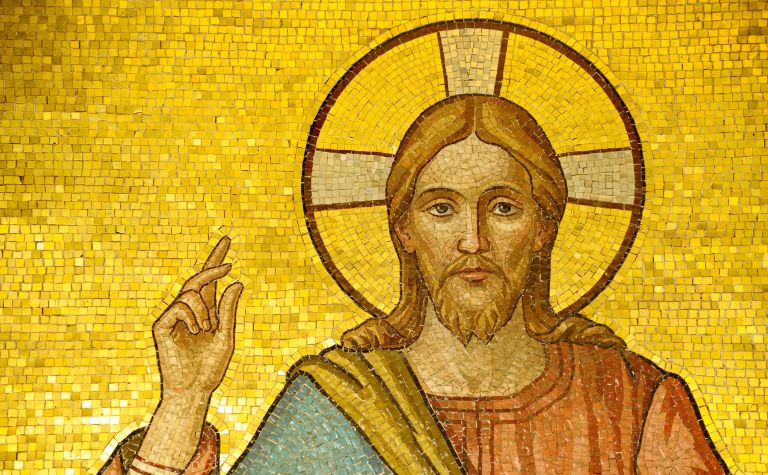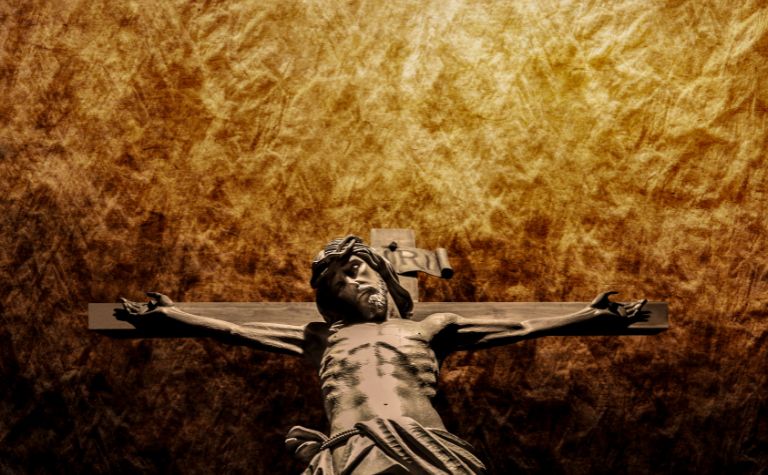Theologians, historians, and anyone else who finds Jesus of Nazareth fascinating have discussed and debated his identity for 2,000 years. Jesus himself made clear claims about who he was, but that hasn’t stopped some readers from coming to their own conclusions about him. Some wonder if Jesus was just a human being, if he was God in the flesh, or if he was even a demigod.
Jesus Christ wasn’t a demigod when the term is defined as a being with partial or lesser divine status than a deity who is sovereign over all things. Jesus also wasn’t a human being who earned or was conferred with, the status of a god or demigod. Jesus of Nazareth has always been fully God.
What is the difference between God and a demigod? How is Jesus different than the demigods of other ancient worldviews like the Greek, Roman, or Nordic? What characteristics of Jesus reveal his identity as God? Keep reading to learn the answers to these questions and others.
Also see What Is A Disciple of Christ? to learn more.

What is the difference between God and a demigod?
The general definition of a demigod is “a being with partial or lesser divine status, such as a minor deity, the offspring of a god and a mortal, or a mortal raised to divine rank” (Oxford Languages). Merriam-Webster’s Dictionary says that a demigod is “a mythological being with more power than a mortal but less than a god.” [1]
Well-known demigods from ancient mythologies include Achilles (Greek), Imhotep (Egyptian), Hercules (Roman), Vali (Hindu), and Sleipnir (Norse). The attributes of demigods aren’t consistent across ancient worldviews.
| God | Demigod |
|---|---|
| Supreme being | Less than supreme |
| Eternal | Are often born and they can die |
| Creator | May share in some responsibilities |
| Sustainer | May share in some responsibilities |
| King | Don’t rule or master anything alone |
| Independent | Are often dependent on other deities and people |
| Lawgiver | Don’t determine morality alone |
An example of the definition of “God” in Christianity is “The supreme being who is creator and ruler of the universe (Gen. 1:1). Christians believe God is a Trinity: Father, Son, and Holy Spirit, three persons and one God.” [1] Other traditional definitions of God include listing his various attributes like infinite, eternal, and unchangeable, in his being, wisdom, power, holiness, justice, goodness, and truth.
Also see Why Do People Leave the Church of Christ? to learn more.

Jesus was worshipped as God, not a demigod
“When the Bible says that Christ is God, it does not ask us to forget a single thing that it has said about the stupendous majesty of God. No, it asks us to remember every one of those things in order that we may apply them all to Jesus Christ.” – Gresham Machen
| God the Father | God the Son | |
|---|---|---|
| Receives honor | Exod. 20:2-3, 34:14; Deut. 5:6-7 | John 5:23; Heb. 3:3-4 |
| Receives glory | Exod. 15:2; Psa. 29:1-3; cf. Matt. 5:16; Rom. 15:6-9 | 2 Tim. 4:18; Heb. 13:20-21; 1 Pet. 4:11 |
| Receives worship | Deut. 6:13; Psa. 97:7; Isa. 45:23; Rev. 19:10 | Matt. 2:2, 11; 8:2; 9:18; 14:33; 15:25; 20:20; 28:9, 17; Phil. 2:10-11; Heb. 1:6; Rev. 1:17, 5:14 |
| Receives prayer | Gen. 4:26; 1 Chron. 16:8; Psa. 65:2; Isa. 44:17; 45:20-22; Joel 2:32 | John 14:14; Acts 1:24-25; 7:59-60; Rom. 10:12-13; 1 Cor. 1:2; Rev. 22:20-21 |
| God the Father | God the Son | |
|---|---|---|
| Worship songs dedicated to him | Exod. 15:21; Psa. 7:17, 9:11, 92:1, 95:1, 96:2, Isa. 42:10 | Eph. 5:19; Rev. 5:9-10; cf. Phil. 2:6-11 |
| Is the object of faith | Gen. 15:6; Isa. 28:16; 43:10; Mark 11:22; Heb. 6:1; 11:6 | Matt. 9:28; John 1:12; 3:15-18; 6:35, 40; 14:1; 20:31; Acts 3:16; 10:43; 16:31; 20:21; 22:19; Rom. 9:33; Gal. 3:26; 1 Pet. 2:6; 1 John 3:23; 5:1-13 |
| Is revered or feared | Deut. 6:13; 10:20; Prov. 1:7; 2:5; 9:10; Isa. 8:12-13 | 2 Cor. 5:10-11; Eph. 5:21; 6:7-8; Col. 3:22-25; 1 Pet. 3:14-16 |
| Is the object of devotion | Deut. 6:13; cf. Matt. 4:10 | Matt. 26:2, 18, 26-29; Mark 14:12-16, 22-25; Luke 22:8-20; Acts 2:38; 8:16; 10:48; 19:5; 1 Cor. 10:16-22 |
| Is the object of affection | Exod. 20:6; Deut. 5:10; 6:4-5; 11:1, 13:6-11; 19:9; 30:6-8-20; 33:9; Josh. 22:5; Neh. 1:5; Dan. 9:4; Matt. 22:37 | Matt. 10:37; Luke 14:26; John 14:15, 21; 15:10; Eph. 6:24 |
Also see Where Was Jesus Christ Crucified? to learn more.

Jesus possessed the attributes of God, not a demigod
“We believe in one Lord, Jesus Christ, the only Son of God, eternally begotten of the Father, God from God, light from light, true God from true God, begotten, not made, of one Being with the Father.” – Nicene Creed
| God the Father | God the Son | |
|---|---|---|
| Pre-existence | The Father has always existed (see verses below) | Matt. 9:13; 20:28; 23:34; Mark 10:45; Luke 4:43; 5:32; 13:34; 19:10; John 8:42; 10:36; 13:3; 16:28; Rom. 8:3; Gal. 4:4-6; Phil. 2:6-7 |
| Eternal | Psa. 90:2; 102:25-27 | John 1:1-3; 8:56-59; 17:5; Col. 1:16-17; Heb. 1:2, 10-12; 7:3 |
| Uncreated | Gen. 1:1; Isa. 43:10 | John 1:3, 10; 1 Cor. 8:6; Col. 1:16-17; Heb. 1:2, 10-12; cf. Prov. 8:22; Rev. 3:14 |
| Immutable | Num. 23:19; Psa. 102:26-27; Mal. 3:6; James 1:17 | Heb. 1:10-12; 13:8; cf. 2 Cor. 1:20 |
| Loving | Deut. 7:8; 10:15, 18; Psa. 146:8; Prov. 3:12; Isa. 63:9; Jer. 31:3; Hos. 3:1 | John 13:34; 15:9, 12-13; Rom. 8:35-39; Gal. 2:20; Eph. 3:19; 5:2; Rev. 1:5; cf. Rom. 5:8 |
| Omnipotent | Job 42:2; Luke 1:37 | Matt. 28:18; John 2:19-22; 10:17-18; 1 Cor. 1:23-24; 2 Cor. 12:9; Eph. 1:19-21; Col. 2:10; 1 Peter 3:22 |
| Omnipresent | Gen 28:15; 1 Kings 8:27; Psa. 139:7-10; John 4:20-24 | Matt. 8:5-13; 18:20; 28:20; Mark 7:24-30; Luke 7:1-10; John 1:47-49; Eph. 4:10-11 |
| Omniscient | John 4:20–24; 1 Kings 8:39; Ps. 139:1–4; Isa. 46:9–10; Matt. 10:30; 1 John 3:20 | Matt. 9:4; 12:25; Mark 2:6–8; Luke 6:8; 21:20–24; John 4:16-18; 11:11–15; 13:10–11, 21–29, 36–38; 16:30–31; 21:17; Acts 1:24; 1 Cor. 4:5; |
| Incomprehensible | Isa. 40:18 | Matt. 11:27; cf. Luke 10:22 |
Jesus was called the names of God, not a demigod
“They that deny Christ to be God, must greatly wrest, or else deny the Scripture to be the Word of God.” – Thomas Watson
| God the Father | God the Son | |
|---|---|---|
| Name above every name | Exod. 3:15; 20:7; Deut. 5:11; 28:58; Pss. 8:1, 9; 20:7; Isa. 45:21–23; Joel 2:32; Luke 1:49; Rom. 2:24; 1 Tim. 6:1; Rev. 11:18; 13:6; 15:4; 16:9 | Matt. 7:22; 24:9; Mark 9:38–39; Luke 10:17; 21:12, 17; John 1:12; 15:21; 20:31; Acts 2:21, 36, 38; 3:6, 16; 4:7-18; 5:28, 40–41; 8:16; 9:14, 21, 27–28; 10:43, 48; 15:26; 16:18; 19:5, 17; 21:13; 22:16; Rom. 10:12–13; 1 Cor. 1:13–15; 6:11; Eph. 1:21; Phil. 2:9–11; Col. 3:17; 1 Peter 4:14; 1 John 2:12; 1 John 3:23; 5:13; 3 John 7; Rev. 2:3, 13; 3:8 |
| God | Deut. 4:35, 39; 32:39; 2 Sam. 22:32; 2 Chron. 15:3; Isa. 37:20; 43:10; 44:6–8; Jer. 10:10; John 5:44; 17:3; Rom. 3:30; 16:27; 1 Cor. 8:4–6; Gal. 3:20; Eph. 4:6; 1 Thess. 1:9; 1 Tim. 1:17; 2:5; James 2:19; 1 John 5:20–21; Jude 25 | Isa. 7:14; 9:6; John 1:1, 18; 20:28; Acts 20:28; Rom. 9:5; Titus 2:13; Heb. 1:8; 2 Peter 1:1 (cf. 1:11; 2:20; 3:18) |
| Lord (YHWH/ Kurios) | Gen. 2:4; Exod. 3:15– 18; Deut. 3:24 LXX [etc.]; 6:4; Pss. 34:8; 118:25; Isa. 8:12–13; 40:3, 13; 45:23; Joel 2:32 | Matt. 3:3; 7:21–22; 8:25; 14:30; Mark 1:3; Luke 3:4; 6:46; Acts 1:24; 2:21, 36; 7:59–60; Rom. 10:9–13; 1 Cor. 1:2, 2:16; 4:4–5; 5:4; 6:11; 7:17, 32–35; 8:6; 10:21–22; 16:22–23; Phil. 2:9–11; 1 Peter 2:3; 3:13–15 |
| Bridegroom/ Husband | Isa. 54:5; 62:5; Jer. 31:32 | Matt. 22:2; 25:1–13; Mark 2:19; John 3:29; 2 Cor. 11:2; Eph. 5:25–27; Rev. 19:7–9; 21:2, 9 |
| King of Kings & Lord of Lords | Dan. 4:37; 1 Tim. 6:15; cf. Deut. 10:17; Ps. 136:2–3 | Rev. 17:14; 19:16 |
| Savior | Deut. 32:15; Pss. 25:5; 27:9; 62:2, 6; 65:5; 79:9; 95:1; Isa. 12:2; 17:10; 45:15, 21; Mic. 7:7; Hab. 3:18 | Luke 2:11; John 4:42; Phil. 3:20; 2 Tim. 1:10; Titus 2:13; 2 Peter 1:11; 2:20; 3:2, 18; 1 John 4:14 |
| I Am | Deut. 32:29; Isa. 41:4; 43:2, 5, 10–11, 25; 46:4; 52:6; cf. Exod. 3:14 | John 4:26; 6:20; 8:24, 28, 58; 13:18–19; 18:5–8 |
| First & Last/ Alpha & Omega/ Beginning & End | Isa. 41:4; 44:6; 48:12; Rev. 21:6 | Rev. 1:7–8, 17b–18; 2:8; 22:12–13 |
Also see Who Am I In Christ? to learn more.
Jesus performed acts of God, not demigods
“The good news is that in the face of Jesus Christ we see the very face of God, the One who has decided to be with us and for us in spite of our sin.” – Kevin Vanhoozer
| God the Father | God the Son | |
|---|---|---|
| Creating and sustaining all things | Gen. 1:1; 2:7; Neh. 9:6; Psa. 95:5–7; 102:25; Isa. 44:24; Jer. 10:16; 51:19; Acts 4:24; 14:15; Rom. 11:36; Heb. 2:10; Rev. 4:11 | John 1:3, 10; 1 Cor. 8:6; Col. 1:16–17; Heb. 1:2-3, 10 |
| Sovereignly ruling over the forces of nature | Gen. 8:1; Exod. 14:21; Job 38:8–11; Pss. 33:7; 65:7; 74:13–14; 77:16–20; 104:4–9; Prov. 8:22–31; Isa. 17:12–13; 35:4–6; Jer. 5:22; 31:35 | Matt 8:23–27 (cf. Mark 4:35–41; Luke 8:22–25); Matt 14:13–21 (cf. Mark 6:32–44; Luke 9:10–17; John 6:1–15); Matt 15:32–39 Matt 17:24–27; Mark 5:19–20 (cf. Luke 8:39); Luke 5:1–11; 7:11–16; John 2:1–11 |
| Illumination and revelation | Gen. 40:8; 41:15–16; Ps. 119:18; Dan. 2:20–23; Amos 3:7 | Matt. 11:27; Luke 10:22; John 1:4–5, 9, 18; 2 Thess. 2:8; 1 Tim. 6:14; 2 Tim. 1:10; 4:1, 8; Titus 2:13 |
| Speaking with divine authority | Cf. “Thus says the Lord” (over 400x); Isa. 40:8; 52:6; 55:11–12 | Matt. 5:20–22, etc.; 7:24–29; 24:35; Mark 1:22; 13:31; Luke 4:32; John 4:26; 7:46; cf. “Amen I say to you” (74x) |
| Word of the Lord | 1 Kings 13:1, 2, 5, 32; 20:35; 2 Chron. 30:12; cf. 2 Sam. 16:23; 1 Chron. 15:15 | Acts 8:25; 13:44, 48–49; 15:35–36; 16:32; 19:10, 20; 1 Thess. 4:15 |
| God the Father | God the Son | |
|---|---|---|
| Salvation | Exod. 15:2; Deut. 32:15; Pss. 3:8; 24:5; 25:5 (etc.); 62:1–2, 6–7; 118:14, 21; 130:8; Isa. 45:15, 21; Titus 1:3; 2:10; 3:4 | Matt. 1:21; Luke 19:9–10; John 3:17; 10:9; 14:6; Acts 4:12; 16:31; 1 Cor. 15:1–4; 1 Tim. 1:1, 15; Titus 1:4; 2:13–14; 3:6; Heb. 5:9; Rev. 7:10 |
| Showing mercy | Pss. 6:2; 9:13; 31:9; 41:4, 10; 56:1; 86:3; 123:3; Isa. 33:2 | Matt. 15:22; 20:30, 31 |
| Forgiveness of sins | Exod. 34:6–7; Psa. 51:4; 130:4; Isa. 43:25; 44:22; 55:7; Jer. 31:34; Dan. 9:9 | Matt 9:1–8 (cf. Mark 2:1–12; Luke 5:17–26); Luke 7:47–49; Acts 5:31; Col. 3:13 |
| Sending the Spirit & his gifts | Joel 2:28–29; John 14:26; Rom. 8:9; 1 Cor. 12:6 | Matt 3:11; Luke 24:49; John 1:33; 7:37–39; 15:26; 16:7–14; 20:22; Acts 2:33; 16:6–7; Rom. 8:9; 1 Cor. 12:5; Eph. 4:8–11; Phil. 1:19 |
| Giving and being life | Gen. 2:7; Deut. 32:39; 1 Sam. 2:6; Ps. 36:9; Jer. 2:13 | John 1:4; 3:15–16; 5:21–26; 10:10; 14:6; 17:3; 20:30–31; Acts 3:15; Rom. 6:23; Phil. 1:21; Gal. 2:20; Col. 3:3–4 |
| Raising the dead | Deut. 32:39; 1 Sam. 2:6; Gal. 1:1 | John 2:19–22; 5:28–29; 6:40, 54; 10:17–18, 27–28; 11:25–26; Acts 2:24 |
| Source of all spiritual blessings | (See references to the right) | Eph. 1:2–3; 1 Tim. 1:2; 2 Tim. 1:2; 2 John 3; Rev. 1:4; 2 Thess. 2:16–17 |
| Judging all people | Gen. 18:25; Deut. 1:17; Pss. 7:9–11; 50:4, 6; 62:12; 75:7; 96:12–13; Prov. 24:12; Isa. 40:9–11; Jer. 25:31; Joel 3:12; Rom. 2:3; 14:10 | Matt. 16:27; 25:31–46; John 5:22–23; Acts 10:42; 17:31; Rom. 2:16; 1 Cor. 4:4–5; 2 Cor. 5:10; 2 Thess. 1:7–8; 2 Tim. 4:1; Rev. 2:23 |
Also see Was Jesus Poor? to learn more.
Jesus had the authority of God, not a demigod
“Depend on it, my hearer, you never will go to heaven unless you are prepared to worship Jesus Christ as God.” – Charles Spurgeon
| God the Father | God the Son | |
|---|---|---|
| God’s highest possible throne | Dan. 4:34–35; Rom. 14:10; Rev 4:2; 5:1; 20:11; cf. 7:15 | Ps. 110:1; Matt. 22:44; 25:31; 26:64; Mark 12:36; 14:62; 16:19; Luke 20:42–43; 22:69; Acts 2:33–35; 5:31; 7:55–56; Rom. 8:34; 1 Cor. 15:25; 2 Cor. 5:10; Eph. 1:20; 2:6; Col. 3:1; Heb. 1:3, 13; 8:1; 10:12–13; 12:2; 1 Peter 3:22; Rev. 3:21; 7:17; 22;1, 3 |
| Claiming to be equal to God | Exod. 20:3, 7; Deut. 5:7, 11; cf. Ps. 110:1; Dan. 7:13–14; cf. Ezek. 1:26–28; see also Exod. 14:20; 34:5; Num. 10:34; Ps. 104:3; Isa. 19:1 | Matt. 9:3 (cf. Mark 2:7); Mark 14:61–64; John 5:17–18; 8:58–59; 10:27–33; 19:7 |
| Ruling over all things | Isa. 44:24; Jer. 10:16; 51:19 | Matt. 11:25–27; 28:18; Luke 10:21–22; John 3:35; 13:3; 16:15; Acts 10:36; 1 Cor. 15:27–28; Eph. 1:22; Phil. 2:10; 3:21; Heb. 1:2; 2:8; Rev. 5:13 |
| Ruling forever | Psa. 9:7; 45:6; 93:2; Lam. 5:19; Dan. 4:34–35; Rev. 5:13 | Luke 1:33; Eph. 1:19b–21; Heb. 1:8; Rev 11:15; cf. Eph. 5:5; Rev. 22:1, 3 |
Also see Was Jesus Homeless? to learn more.
References:
[1] Source
[2] Westminster Dictionary of Theology. p. 132.
Related Articles
The crucifixion of Jesus of Nazareth is one of the most pivotal moments in world history. The death of a poor Jewish carpenter during the days of the Roman Empire wouldn't ordinarily have garnered...
Tattoos are common today in the Western world, and people in other cultures have been permanently marking their bodies with images, designs, and words for thousands of years. People had tattoos long...
